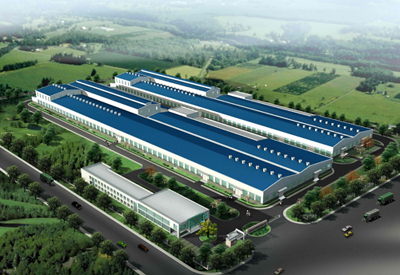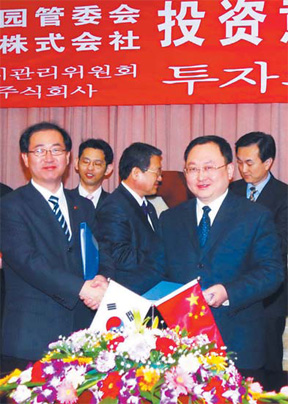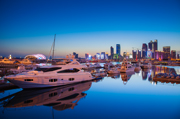Qingdao Tonghe Ecological Industrial Park
Updated: 2009-08-26
|
|||||||||
Business park seeks industry/ecology balance
By Dai Yan
 |
A rare blend of commerce and conservation, the Qingdao Tonghe Ecological Industrial Park is set to blur the boundaries between economic imperatives and environmental responsibility. Located in the eastern province of Shandong, the park seeks to combine apparently contradictory concerns.
On one hand it is looking to develop an integrated transport system and a number of conventional commercial concerns, whilst on the other it is committed to the pursuing a far greener agenda - including several ecological projects, an environmental protection industry, eco-tourism and a range of energy-efficient accommodation.
Wang Fujun, director of the Tonghe Park's Management Committee, which oversees the park, cheerfully acknowledges these apparent contradictions: "This eco-industrial park is a mixture of eco-industry and eco-nature. It has been designed to promote the co-importance of industry, commerce and the need to live a sustainable lifestyle."
Currently covering an area of 4.26 sq km, with a planned expansion to 20 sq km, the development of an integrated transport system is at the very heart of the project. This initiative will see the strengths of the areas existing road network - including the Qingdao-Yinchuan highway, the Gaomi-Pingdu highway, and the Pingdu-Dongyin road link - seamlessly integrated with the facilities of the planned Pingdu-Beijing rail link.
|
Business and botany: Chinese and Korean delegates meet to mark the success of Qingdao's "green" industrial development. |
This improved infrastructure will be one of the key prerequisites for developing the parks' industrial and commercial base. It is hoped that the fiscal input of the park's business community will have a huge economic knock-on effect to the well-being of the adjacent city of Qingdao. When completed, the park will form a vital link in the development of a commercial belt along the nearby Zehe River.
The park's proximity to the river and other areas of natural beauty has prompted the park's management to take a strict ecologically-aware overview of its development. This has seen the adoption of a number of green policies, including tough guidelines on recycling and sustainable development. These initiatives have been designed to permit the harmonious co-existence of the area's natural ecosystem alongside its emerging commercial landscape.
One of the benefits of maintaining an environmental balance in the park is the scope it leaves open for building the area's leisure and tourism industry. By fully utilizing the appeal of the natural environment through promoting lesser-known aspects of the landscape in the park, its management hopes to firmly establish the area on the local tourist trail.
The area currently features 1,000 acres of woodland, a golf course and a series of "eco-villas", environmentally-friendly short-stay apartments. It is hoped to boost its tourist appeal through a raft of new initiatives, including an eco-hotel, an aerobics leisure centre and a sightseeing bridge straddling the Zehe.
For those looking for longer-term accommodation in the area, a series of environmentally-friendly residential areas are also a firm part of the proposition. These will offer comfortable living conditions for a substantial number of businessmen and office workers, complete with all the requisite services and with the added bonus of a beautiful setting.
The park will be constructed in line with sound environmental guidelines, highlighting the importance of recycling and maintaining an ecological/industrial balance.
This will see it adopt an emerging focus on a number of cutting-edge industries, including energy-saving, environmental protection, new energy sources, innovative materials, computing and information technologies, automotive electronics, finished automobile production, investment casting, biotechnology development, as well as marine and fine chemical production.
These industries, together with the automotive spare parts industry and a series of eco-tourism initiatives, will form a close industrial chain. In light of this, any project seeking approval for development in the park needs to meet a strict range of criteria, particularly with regards to environmental protection.
The park's planners have specified the development of an effective intelligent traffic management system, connecting all the highways, railways and airports. A green belt zone will also be included on each side of the main roads running through the park, in a bid to maintain an afforestation rate in excess of 40 percent.
At present, this park is seeking to attract investments from home and abroad. Many investors from a number of different countries and regions, including Korea, Japan, Hong Kong, Germany, Russia, America and India, have already completed inspection tours of its facilities. So far, more than 50 businesses have signed up for premises in the park, including companies in the electronics, environmental protection, engineering, software and chemical industries.





